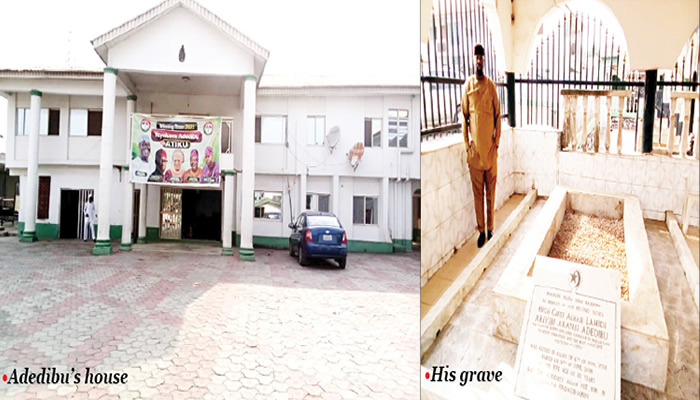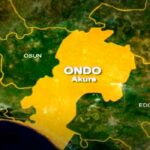
The late Chief Lamidi Adedibu was a popular stalwart who dominated Oyo State and its capital city, Ibadan, as a master political kingmaker among many other things. GABRIEL OSHOKHA, who visited his Molete residence, writes
The late Chief Lamidi Adedibu was well known within and outside the political circle. Many Ibadan residents, the Oyo State capital, respectfully refer to him as “Baba Molete.”
This is because Adedibu’s palace is a few measured steps from the flyover at Molete, an area that was once dreaded at night.
Someone once jokingly said that Adedibu could eavesdrop on happenings at Molete Park from his palatial sitting room and when he sneezed, the passers-by and layabouts beneath the flyover caught cold and immediately maintained decorum.
However, to party loyalists, Adedibu was a political tactician who understood the game of politics. And on a whim, he could change the order of the game midstream.
Adedibu had a larger-than-life image. He was feared and despised by his political rivals, because he was also fearless, bold, and courageous. He exemplified the fact that politics is not for the lily-livered but for the brave and daring.
Adedibu’s romance with politics dates back to the 1950s. While learning the ropes, he mingled with the high and mighty political juggernauts.
He pitched his first political tent with the Ibadan Peoples Party, and thereafter joined the Action Group, under the leadership of the sage, Chief Obafemi Awolowo. And as is all politicians’, Adedibu defected to the National Party of Nigeria, then-led by Chief Adisa Akinloye and Chief Richard Akinjide, all of blessed memory.
Even those at the centre of power acknowledged the fact he had the party under his firm grip. His unmatched political influence and the manner in which he controlled the affairs of the party when he was in charge were perhaps the reasons why Chief Olusegun Obasanjo described Adedibu as the “Father of the PDP.” He was also referred to as the PDP garrison commander.
While the politician lived, aspirants for different electoral positions and board appointments thronged Adedibu’s Molete palace for endless caucus meetings. There was continuous going and coming of politicians, political aspirants, and associates to the palace to pay homage to the master of politics.
However, since the politician’s death, all of these displays of cosmetic political homage have ceased.
Power, they say, is transient.
When Adedibu breathed his last on June 11, 2008, time gradually eroded all that he represented and his enormous political authority.
The regular screeching of car tyres and the sounding of sirens signalling the arrival of “very important dignitaries” to Adedibu’s palace had significantly decreased.
Certainly, Adedibu’s loyalists and supporters of the PDP, his party, would sorely miss this political strategist. Those whose shoulders he regularly patted with his generosity will feel the vacuum created by his transition.
He warmed his way into the hearts of his party’s loyalists and many others through his prompt response to their dire needs.
His many loyalists and even the lowly in the neighbourhood were always sure of one good meal a week.
They were sure that Adedibu would make necessary provisions for Amala and Gbegiri every Friday.
Such was the generous nature of the late politician that he occasionally doled out cash to those who were always around him on a good day. That was how he made his ‘people’ happy.
On Thursday, February 2, The PUNCH visited Adedibu’s Molete home with the mission to confirm if the late politician’s loyalists and political associates were still touching base with the one-time Mecca. But aside from prayers and supplications that filtered from a mosque adjacent to a two-storey building, The PUNCH did not find any political figures on the wide-ranging premises.
Our correspondent spoke with Adedibu’s closest aide, Mr Kayode Adeyemi, who served the master of politics for 29 years until the last day.
He said, “Sincerely, he was a man to reckon with; a flexible-minded person, a philanthropist. He acted on what he believed in. He was a man of his words.
“It appears the political power he wielded was God-given. He controlled all of the political parties in the area. He single-handedly appointed councillors, chairmen of political parties, and paid their nomination fees.”
One of Adedibu’s sons, Niyi Adedibu, took our correspondent around the wide premises of the famous politician Molete home residence.
Like his father, politics runs in the veins of the young man. And, as he stood transfixed at his late father’s grave, The PUNCH noticed a sudden change in his mood.
He pointed at the grave, and said, “Here lies my father. He taught me everything I know about politics. When he visited me in the UK before his death, he told me that rigidity has no place in politics because “there are no permanent friends or enemies in politics.”
He added, “The goodness of men lives after them. And just like fire, our kindness to humanity in whatever form smoulders long after we have exchanged our mortality for immortality.”
A neighbour, Hon. Toyin Okesola, paid posthumous tribute to Adedibu, saying, “He was a good man and father to all.
“If you came sorrowfully with a need, Baba Adedibu would make sure the need was met. While Baba was alive, he often proverbially told us that until everyone would bow to death, many would always remember that Baba Adedibu has died.
Reflecting on Adedibu’s benevolence, Mrs Okanlawon Olayinka said, “He was a great political mentor to many people. He was known throughout Ibadan and across Nigeria. Through him, many people became councillors, House of Representatives’ members, senators, and even state governors. He gave succour to the needy and unburdened their pains.
“A woman with tears rolling down her cheeks, once sought Baba Adedibu’s financial assistance to set up a small-scale business to cater for her family’s needs.
“Moved to pity, Baba Adedibu not only gave her N250,000 for rent, but also empowered the woman with an additional N200,000 for wares. And for the stability of the business, Baba Adedibu made a separate weekly provision of N5,000 for the woman. He was a good man, and his neighbours here in Molete partook of his milk of open-handedness.”
Adedibu lived and died like a king. He was always surrounded by his “boys.”
Some people denigrated them as Baba’s bodyguards or thugs. They were always on the lookout, and their mere presence would make a lion nervous. That means it was not easy gaining entry to Adedibu’s Molete palace without his approval, except the person was heading for a suicide mission. Guess what the repercussions will be?
Also, Wasiu Olaniyi, a former Adedibu’s boy, sounded a frightful warning to those who still see thuggery as a means of survival.
Recounting his experiences to The PUNCH, he said, “Thugs do not live longer. They can die at any time. Thugs should therefore have a change of heart, learn a trade, or acquire a good education. There is no one whom God cannot change. Many thugs have lost their lives to thuggery. About six of Baba Adedibu’s boys have died.
“Baba Adedibu never asked us to go to any place and incite violence or sent us to kill anyone. He sacrificed his comfort for the hardships of the poor. He fought for the defenceless, whose rights had been violated and whose voices had been silenced by the oppressors of society.”
At a recent caucus meeting in the state, some PDP members reminisced about the stabilising role played by Adedibu as “a father of the party.” They also expressed their reservations on matters capable of jeopardising the party’s victory in the March 11 election.
A staunch stakeholder of the party who spoke to The PUNCH on condition of anonymity noted that “too much power is concentrated in the hands of the incumbent. And remember, the governor is an executive governor.”











